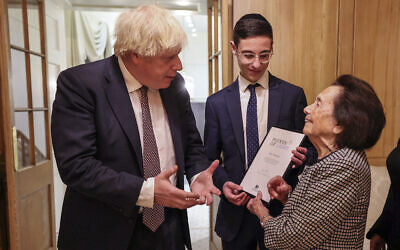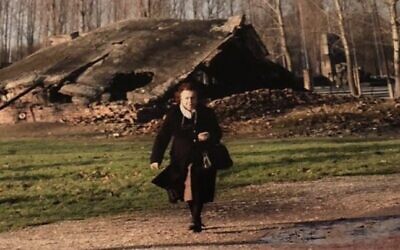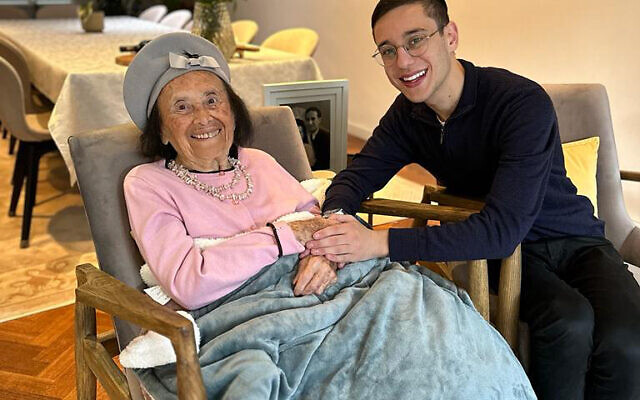OPINION: My great-grandmother Lily and all the other ordinary people of the Holocaust
Author and educator Dov Forman reflects on his visit last week to Auschwitz-Birkenau, where his great grandmother Lily Ebert, now aged 99, walked almost 80 years ago.
Last week, thanks to the International March of the Living and the Auschwitz–Birkenau Foundation, I walked into the Auschwitz Birkenau memorial site for the first time (with my mother) where my great grandmother Lily Ebert MBE walked almost 80 years ago.
I have spent so much time with my great grandmother learning about her Auschwitz testimony. Together we have written her memoir Lily’s Promise and we have over two million followers on TikTok where we teach people about Lily’s harrowing Holocaust testimony.
But it was still a shock to actually be there myself: the vastness, the freezing cold, the towering infrastructure, a factory of death.
And whilst I was there, in the place where so much evil had once taken place I thought of the theme for this year’s Holocaust Memorial Day – Ordinary People.
The scale of such evil leaves the extent of its effects difficult to measure, but there is almost no doubt that the majority of those affected, on all sides, were regular, ordinary people like you and me.

First and foremost, I thought of the victims of this tragedy. When Lily stepped foot onto those infamous train tracks, it was at the age of 20 years old. I stepped foot on those very same tracks at the age of 19. When Lily entered Auschwitz-Birkenau it was with her mother, three younger sisters and a little brother.
Her mother, younger sister and younger brother were sent straight to the gas chambers and murdered on the day that they arrived in July 1944 (together with about 15,000 other people that day, including 100 other people from her extended family and everyone from her community just because she was Jewish). 1 million innocent people were murdered in Auschwitz.
So when Lily left Auschwitz to be transported to a slave labour camp in Germany, in October 1944, it was with only two of her sisters – the rest of her family were burnt in the crematorium with their ashes lost into the evil of the place.
I really tried to imagine my great grandmother there, standing in the same place that I stood. I was not able to comprehend how she survived such an experience.
When Lily stepped foot onto those infamous train tracks, it was at the age of 20 years old. I stepped foot on those very same tracks at the age of 19.
Numbers and statistics can be hard to fathom. But it is almost impossible not to be haunted by the seemingly infinite mountain of shoes, in Block 5. Ordinary shoes, that once belonged to ordinary people.
As I stood there learning about their collection and conservation, I could not help but think of how the shoe I was holding could have belonged to someone in my great grandmother’s family who was murdered there. There is nothing that strikes more than seeing the simple reflection of humanity, the shoes that people walked in everyday: perhaps to work, or through the park, or on a walk with a friend.

Whilst there, I said the memorial prayer for my great grandmother’s mother Nina, younger sister Berta, and little brother Bela.
We must not hesitate to place responsibility upon those disgusting individuals who had anything to do with enabling the terrors that befell those like my great grandmother.
But we must remind ourselves that much of what took place was carried out by regular, educated people. Ordinary, educated people including (but not exclusive to) doctors, lawyers, teachers, business owners and policemen all had a part that they actively played.
As we rightfully persecute and condemn those who participated, we can only truly appreciate the reality and scale of such an enterprise if we acknowledge the fact that those who are responsible, on the face of it, led ordinary lives. In my opinion, this should make us more wary, and more conscious of how dangerous society can be and how we need to learn the lessons to avoid any kind of repetition at all costs.
Having said that, this is not the biggest risk that faces us today. The vast majority of us, I should hope, are not quite on the path towards becoming active perpetrators of mass genocide and discrimination.
Tangible evidence is waning away, and fast. The shoes I saw, the lengths that must be gone in order to maintain them, are perhaps emblematic of the much larger issue.
Our biggest concern regards the third category of ordinary people within the scope of those involved in the Holocaust: the bystanders. The majority of us today are much more likely to end up as bystanders, passive passers-by, rather than active perpetrators of societal injustice. The physical reality of the time within which we live puts us at enormous risk.
Tangible evidence is waning away, and fast. The shoes I saw, the lengths that must be gone in order to maintain them, are perhaps emblematic of the much larger issue.
It was whilst I was at the Auschwitz-Birkenau Memorial Site that I found out about the passing of Auschwitz survivor Zigi Shipper BEM, on his 93rd birthday. Zigi was an inspiring person, who I was privileged to meet. He, like my great grandma Lily, had a passion to teach about the horrors of his past, and the importance of my generation to continue in this mission.
Survivors of the Holocaust, primary sources of witness testimony, are fading from us at an alarmingly rapid rate. My own great grandmother Lily is 99.
We cannot allow ourselves to become bystanders. Survivors like Zigi Shipper and my great grandmother Lily Ebert survived so that we could pass on their message.
My work with my great grandmother, and this trip to the Auschwitz-Birkenau Memorial site have ingrained in me that it is up to us, those of the more recent generations, my generation, to make sure that we do not stand idly by as long as there is hatred in this world.
We are all human, flesh and blood, and all ordinary to our core.
At the root of the suffering endured by my great grandmother and millions of others was the idea that one human being is superior to another. All it took was for this idea to enter the minds of ordinary people for society to take such a dramatic turn for the worse.
We must never allow this to happen again.

Thank you for helping to make Jewish News the leading source of news and opinion for the UK Jewish community. Today we're asking for your invaluable help to continue putting our community first in everything we do.
For as little as £5 a month you can help sustain the vital work we do in celebrating and standing up for Jewish life in Britain.
Jewish News holds our community together and keeps us connected. Like a synagogue, it’s where people turn to feel part of something bigger. It also proudly shows the rest of Britain the vibrancy and rich culture of modern Jewish life.
You can make a quick and easy one-off or monthly contribution of £5, £10, £20 or any other sum you’re comfortable with.
100% of your donation will help us continue celebrating our community, in all its dynamic diversity...
Engaging
Being a community platform means so much more than producing a newspaper and website. One of our proudest roles is media partnering with our invaluable charities to amplify the outstanding work they do to help us all.
Celebrating
There’s no shortage of oys in the world but Jewish News takes every opportunity to celebrate the joys too, through projects like Night of Heroes, 40 Under 40 and other compelling countdowns that make the community kvell with pride.
Pioneering
In the first collaboration between media outlets from different faiths, Jewish News worked with British Muslim TV and Church Times to produce a list of young activists leading the way on interfaith understanding.
Campaigning
Royal Mail issued a stamp honouring Holocaust hero Sir Nicholas Winton after a Jewish News campaign attracted more than 100,000 backers. Jewish Newsalso produces special editions of the paper highlighting pressing issues including mental health and Holocaust remembrance.
Easy access
In an age when news is readily accessible, Jewish News provides high-quality content free online and offline, removing any financial barriers to connecting people.
Voice of our community to wider society
The Jewish News team regularly appears on TV, radio and on the pages of the national press to comment on stories about the Jewish community. Easy access to the paper on the streets of London also means Jewish News provides an invaluable window into the community for the country at large.
We hope you agree all this is worth preserving.






















